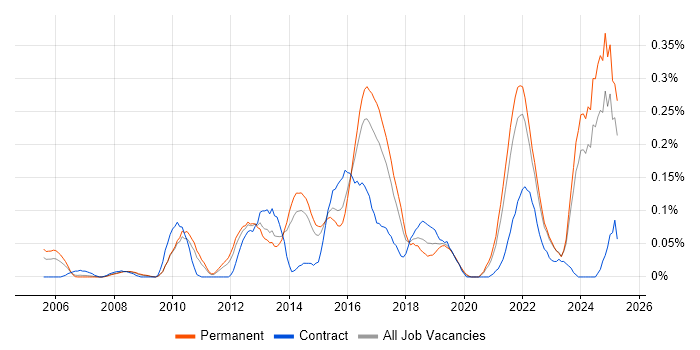Lead Solution Architect
England > Yorkshire
The median Lead Solution Architect salary in Yorkshire is £94,637 per year, according to job vacancies posted during the 6 months leading to 12 May 2025.
The table below provides salary benchmarking and summary statistics, comparing them to the same period in the previous two years.
| 6 months to 12 May 2025 |
Same period 2024 | Same period 2023 | |
|---|---|---|---|
| Rank | 137 | 190 | 296 |
| Rank change year-on-year | +53 | +106 | -34 |
| Permanent jobs requiring a Lead Solutions Architect | 13 | 30 | 6 |
| As % of all permanent jobs advertised in Yorkshire | 0.47% | 0.52% | 0.074% |
| As % of the Job Titles category | 0.50% | 0.54% | 0.081% |
| Number of salaries quoted | 9 | 26 | 5 |
| 10th Percentile | £71,350 | £68,750 | £72,100 |
| 25th Percentile | £90,801 | £72,493 | £74,500 |
| Median annual salary (50th Percentile) | £94,637 | £82,500 | £79,000 |
| Median % change year-on-year | +14.71% | +4.43% | -4.24% |
| 75th Percentile | £112,500 | £86,250 | £84,750 |
| 90th Percentile | - | £90,625 | - |
| England median annual salary | £94,637 | £85,000 | £90,000 |
| % change year-on-year | +11.34% | -5.56% | - |
All Permanent IT Job Vacancies
Yorkshire
For comparison with the information above, the following table provides summary statistics for all permanent IT job vacancies in Yorkshire. Most job vacancies include a discernible job title that can be normalized. As such, the figures in the second row provide an indication of the number of permanent jobs in our overall sample.
| Permanent vacancies in Yorkshire with a recognized job title | 2,607 | 5,532 | 7,393 |
| % of permanent jobs with a recognized job title | 93.44% | 95.23% | 91.17% |
| Number of salaries quoted | 1,363 | 4,282 | 3,507 |
| 10th Percentile | £26,050 | £27,000 | £31,250 |
| 25th Percentile | £31,625 | £35,000 | £39,125 |
| Median annual salary (50th Percentile) | £48,000 | £49,136 | £54,882 |
| Median % change year-on-year | -2.31% | -10.47% | +9.76% |
| 75th Percentile | £68,750 | £65,000 | £70,000 |
| 90th Percentile | £86,250 | £80,000 | £82,500 |
| England median annual salary | £57,500 | £53,500 | £60,800 |
| % change year-on-year | +7.48% | -12.01% | +1.33% |
Lead Solutions Architect
Job Vacancy Trend in Yorkshire
Job postings that featured Lead Solutions Architect in the job title as a proportion of all IT jobs advertised in Yorkshire.

Lead Solutions Architect
Salary Trend in Yorkshire
3-month moving average salary quoted in jobs citing Lead Solutions Architect in Yorkshire.
Lead Solutions Architect
Salary Histogram in Yorkshire
Salary distribution for jobs citing Lead Solutions Architect in Yorkshire over the 6 months to 12 May 2025.
Lead Solutions Architect
Job Locations in Yorkshire
The table below looks at the demand and provides a guide to the median salaries quoted in IT jobs citing Lead Solutions Architect within the Yorkshire region over the 6 months to 12 May 2025. The 'Rank Change' column provides an indication of the change in demand within each location based on the same 6 month period last year.
| Location | Rank Change on Same Period Last Year |
Matching Permanent IT Job Ads |
Median Salary Past 6 Months |
Median Salary % Change on Same Period Last Year |
Live Jobs |
|---|---|---|---|---|---|
| West Yorkshire | +48 | 9 | £94,637 | +14.71% | 1 |
| Lead Solutions Architect England |
|||||
Lead Solutions Architect Skill Set
Top 30 Co-occurring Skills and Capabilities in Yorkshire
For the 6 months to 12 May 2025, Lead Solutions Architect job roles required the following skills and capabilities in order of popularity. The figures indicate the absolute number co-occurrences and as a proportion of all permanent job ads across the Yorkshire region featuring Lead Solutions Architect in the job title.
|
|
Lead Solutions Architect Skill Set
Co-occurring Skills and Capabilities in Yorkshire by Category
The follow tables expand on the table above by listing co-occurrences grouped by category. The same employment type, locality and period is covered with up to 20 co-occurrences shown in each of the following categories:
